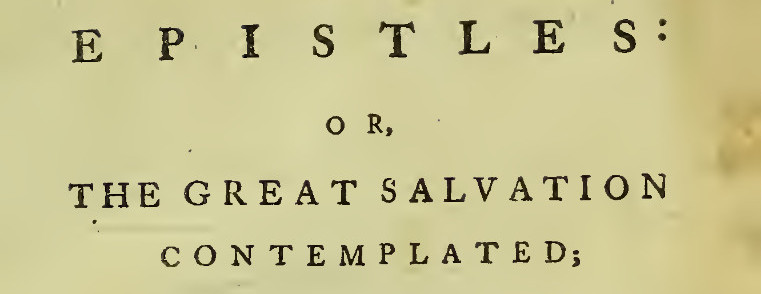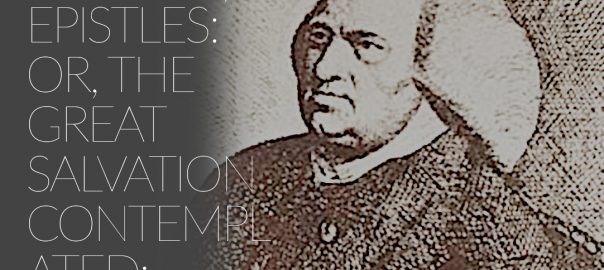In the third letter of The Great Salvation Contemplated, James Relly argues against the belief that human beings have the power in themselves to exercise saving faith. Human beings cannot believe if not Christ works in them. The elect are those who are predestinated to have faith and enjoy salvation in time. But the salvation enjoyed by the elect in time is not to the final exclusion of the rest in eternity.
Read the first two letters here.

Letter III.
Dear Brethren,
I DO not pretend to have given you, in my last letter, a perfect copy of the Arminian creed; nay, I am well aware of the contrary. I know, that instead of our own works of righteousness and creature actings, which they make to be the conditions of salvation; I substitute a total cessation from all dependence and hope on these: and a simple unreserved submission to Christ. Nor are we agreed, on the object of our faith and obedience.—I, professing all things that are written in the scriptures, believe, that it is not in the nature of man to do, nor even to will what is good, and accords with the will of God. I must therefore always conclude it a fatal mistake, proceeding from the grossest ignorance of themselves, of the scriptures, and of the power of God; for men to pretend, to will and power in themselves to do what can save them, either in the whole or in part; or even recommend them to the favor of God, or qualify them for its reception. Man, thus considered, I believe that God reconciled him to himself in Jesus Christ, who in our nature, name, and persons, fulfilled all righteousness, and inherited the promise: Hence, that glorious record, “God hath given to us eternal life, and that life is in his Son.” He hath given it to us, not as righteous persons, but as sinners; not to us as believers, but as unbelievers, not to us as obedient, but as disobedient. Nor does man’s unbelief and refusal of the gift of God, make void his eternal donation, whose gifts and callings are without repentance: for if God alter his purpose of mercy and grace towards men, and recall the gift of eternal life, which he hath given them in his Son; then is their unbelief no longer culpable, nay, it is no longer unbelief, but an uncensurable sentiment.
But while unbelief is iniquity, whilst such who are under its influence, blasphemously, yet with impunity, give the lie to God; the grace which is opposed must certainly remain permanently free, full, and glorious. Hence, we fight, not as though we beat the air; nor do we preach uncertainties to man: we hold forth to them a finished salvation, a glorious rest remaining for them in Christ Jesus: into the glory and riches of which, nothing but their disobedience or unbelief prevents their entrance.
Undoubtedly, this is the hearing by which faith cometh; it is wisely and graciously adapted to the helpless state of man. But O! how widely different is this from the faith of such, who make man’s righteousness the condition of salvation, they know not the helpless state of the creature, nor that he is indeed subjected to vanity. Hence, they see no reason wherefore their salvation should be finished and secured in Christ. They believe it not; it is a doctrine repugnant to their hope and desire, and therefore they generally meet and encounter it with hatred or derision. Like the old Egyptian talk-masters,they call on you to make your tale of bricks, without allowing you proper materials: they call on you to obey, without communicating sufficiency, or even giving you a certain invariable rule for the extent, nature, and properties of true obedience. When they speak of believing, they acknowledge no truth until it is believed, nor a Christ, until he is applied. Hence, that very absurd saying, so frequent in the mouth and writings of some, who would be thought to be ministers of the gospel, “An unapplied Christ, is no Christ at all.”
But, I need not yet take pains to show you, that, by conditional salvation, I understand present salvation, or the salvation of Christ, enjoyed in this life: the conditions of obtaining and rejoicing in which, are undoubtedly faith and obedience; for, if we believe it not, we possess it not: and if we obey it not, we rejoice not in it: yet this faith and obedience, is the free gift of him who worketh in us to will and to do of his own good pleasure.” The apostle, speaking of faith, tells us, that it “comes by hearing, and hearing by the word of God.” By affirming and illustrating the truth, and persuading men that they have, in Jesus, the forgiveness of sin: that they are saved in him, justified in him, sanctified and preserved in him: until, believing it unto righteousness, and confessing it unto salvation, they rejoice in him with joy unspeakable, and full of glory.
Hence, Salvation spoken of, and described in this manner, perfectly consists, not only with the free unconditional salvation of the elect; but even with the doctrine of universal salvation: when we distinguish between a finished salvation, the present enjoyment, and a future enjoyment.
The elect, where applied to the persons of mankind, in subordination to Christ, intends such, who are made choice of in time to the belief of the truth, and the joy of salvation.
These are chosen to this graces not on the consideration of present, nor on the foresight of future merit in themselves: but he, whom they sought not, is pleased to be found of them: Yea, lest aught should be placed to the account of human righteousness, the unerring Spirit has thus drawn the character of the chosen — “Not many wise men, after the flesh; not many mighty, not many noble; but God hath chosen the foolish, the weak, the base, the despised.” And the reason, which he has vouchsafed to give for his choice, is, “That no flesh should glory in his presence, but he that glorieth should glory in the Lord.”
Hence, I propose, that the elect are not a people chosen to be the objects of God’s love and salvation, to the final exclusion of others: but a people chosen to believe the truth, and to rejoice in the salvation of Jesus in time; while others yet remain in a state of ignorance, of what they are equally entitled to with the elect.
The elect, who are predestinated to the present knowledge, and enjoyment of eternal life, can only attain to this happiness through faith and obedience, as spoken of before, under the article of conditional salvation. But, as Christ effects this in them, by his gospel and free spirit, it comes not, as I have hinted before, under the imputation of man’s righteousness: nor is it a denial to the elect’s being freely saved, since what a man possesses without cost to himself, is free to him.
Should it be asked, what advantage have the elect above others? I answer, much every way: For “one day in his courts, is better than a thousand in the tents of wickedness; the secret of the Lord is with them; he hath shewed them his covenant: They have righteousness, peace, and joy in the Holy Ghost: Through all the vicissitudes of life, and in death, they have assurance of eternal life.
If the scriptures ascribe predestination and election to the sovereignty of God, they clash not with my idea of it: since there can be none other reason assigned, for his choosing one rather than another, to the belief and enjoyment of the truth, than his sovereign will and pleasure. Do the sacred writings ascribe their election, &c. to free grace of God? This also corresponds with the hints above mentioned, as appears from the character of whom he hath chosen; and also from his manner in bringing them to the knowledge of the truth.
According to this idea of election, the consistency, and even the expediency of the apostle’s exhortation, is perceivable: “Give all diligence, to make your calling and election sure”, and, again, “Put on, as the elect of God, bowels of mercy, long-suffering,” &c.
Election and predestination, thus considered, are no denial to salvation finished for all, in the person of Christ; nor is it an objection to the future final happiness of all; for whom Christ died: nay, it rather supposes it; if the predestinate and elect are so called, from their being chosen to believe, and enjoy in time, what the residue neither know, nor enjoy but in eternity. But, as I purpose, towards the close of these letters, to explain myself more fully on this subject, I shall wave a further explanation of it here, to observe — That, in my first letters, I intended only a few hints to you, which I judged necessary to prepare the way to the subject on which, in particular, you defined to know my mind. Therefore, my intention is, in a few letters, to confine myself to the subject of God’s universal love and salvation in Jesus Christ, I am not aware of any hurt to your minds, that can proceed from it, if you are indeed satisfied with Christ; being well persuaded, that if you are really allured of the freeness of his salvation, you will no more enter into doubtful and fleshly deputations, concerning the extent of it.
May Jesus Christ, the apostle and High Priest of our profession, render it more than an amusement to you! May he use it to endear his name, person, salvation, and Spirit to you!
Such is the Prayer and desire of
Yours, &c.
J. R.
